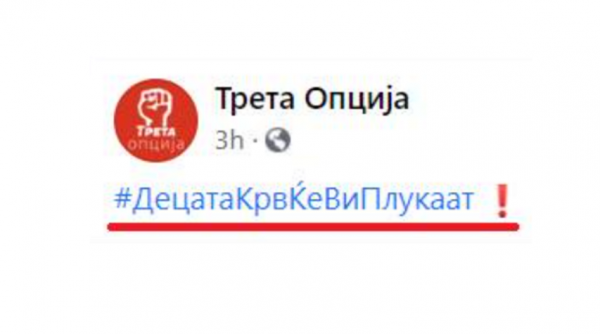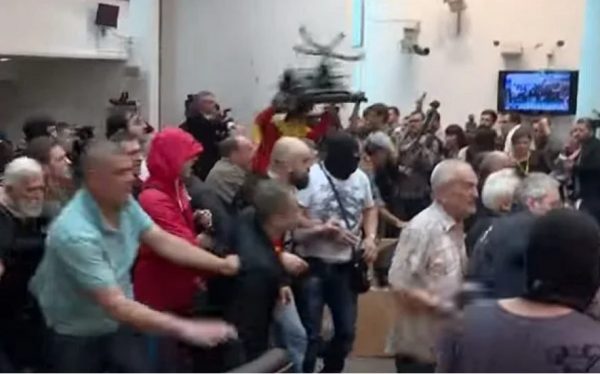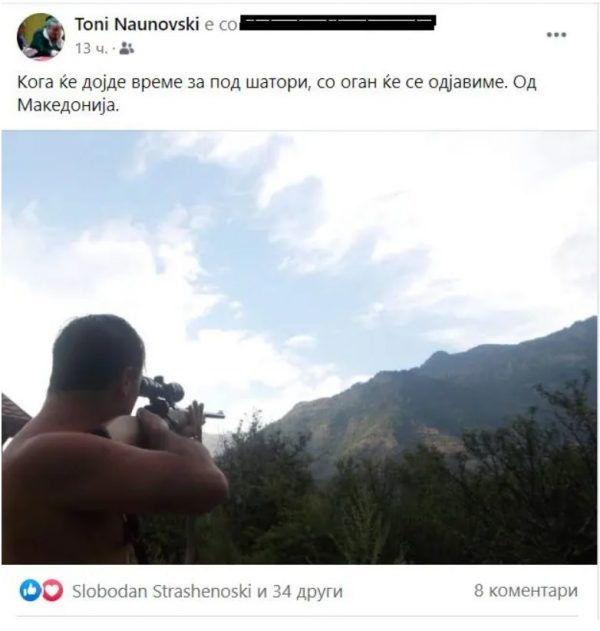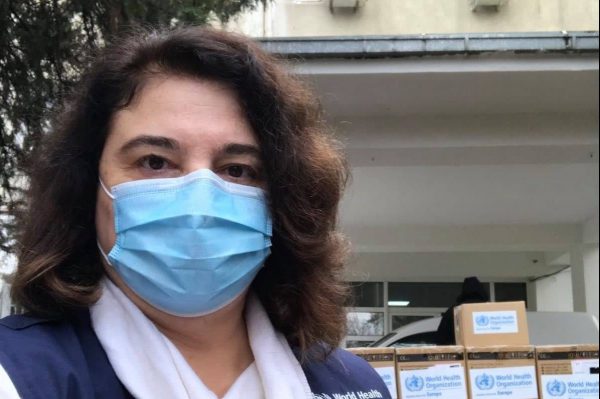The policy of impunity for spreading and promoting hate speech in public, in a way can be assumed as justifying it. The silence and impunity have the same effect as if expressing consent to it, and even encouraging it. And even worse, it encourages the use of hate speech, which inevitable leads to crimes committed out of hatred.
The public can testify to how hatred on the social networks and in the public space leads to danger of causing and resulting in hate crimes, and even acts of political violence.
HATE SPEECH, ENCOURAGING AND CALLING FOR VIOLENCE
Hence, for example, the messages of Levica leader and MP Dimitar Apasiev “We will all shoot you” and “Your children will be spitting blood” have prompted threats from his supporters that the expression “Your children will be spitting blood” is not hate speech but rather it will happen to all those not like-minded. 

Former member of the Commission for Protection against Discrimination, Toni Naunovski, on January 25 posted a photo on Facebook showing him holding a pointed sniper rifle in his hands, with the message: “When the time comes for under tents, we will sign out with fire. From Macedonia”. The post of the former “anti-discriminator” later was withdrawn, but caused enough damage.
In this case, CIVIL’s monitoring registered several comments with hatred and threats. There was a comment of Jove Hadzievski under the status: “Tell us when the time comes, while Zharko Stoleski commented: “1 precious and 100 people are enough… I’m starting from Murtino”. The threatening messages are more than clear. It’s a matter of a call for armed violence, and in the comments those calls are confirmed and detailed.
Bloody examples of what hate speech leads to
In the past we witnessed how the violent attack on the Parliament on April 27, obviously organized by the installations of Gruevski’s regime, used explicit hate speech as a main weapon of propaganda and mobilization from the first day following the early parliamentary elections held in 2016, which marked the end of the rule of Gruevski’s authoritarian clique. Such was the speech of Valentina Bozinovska, then president of the Committee for Relations with Religious Communities, who at the protests in front of the SEC announced that a “Night of the long knives” would occur if the SEC decided upon the complaints contrary to VMRO-DPMNE’s wishes.
Former Prime Minister and current fugitive from justice Nikola Gruevski at one time called on citizens “not to sit in slippers, but to defend their country”, a day before the protests “For a common Macedonia” began.
“The night of the long knives” actually did take place on April 27, 2017, when several hundreds of protestors from the association “For a common Macedonia” attacked the Macedonian Parliament in order to prevent the election of Talat Xhaferi as President of Parliament. Following the violence that took place that night in the Parliament, April 27 was named “The bloody Thursday”, more specifically, that is the day when an attempt for killing democracy was made! These are just few examples that in addition to the hate speech also encourage(d) hate crimes.
DEFINITIONS
Hate speech is a term that refers to speech that has the intention to degrade, disturb or cause violence or activities based on prejudice against persons or groups of people on the basis of their race, gender, age, ethnic origin, nationality, religion, sexual orientation, gender identity, disability, language ability, moral or political views (such as height, weight and hair color), mental capacity and any other feature.
The term refers also to written and oral communication, as well as some forms of conduct in public places.
According to the law, hate speech is any speech, gesticulation or conduct, written text or displays that are prohibited due to the possibility of inciting violence or prejudice action against or by a protected individual or group or due to degrading or intimidating a certain individual or group.
According to Article 23 of the Criminal Code, inciting violence includes:
(1) Whosoever premeditatively instigates another to committing a crime, shall be punished as if he had perpetrated the crime himself.
(2) Whosoever premeditatively instigates another to commit a crime, for which a sentence of five years of imprisonment or a more severe sentence could be pronounced according to a law, and there is not even an attempt of this crime, shall be punished as for an attempted crime.
The law can recognize a protected individual or group according to certain characteristics. In some countries, any victim of hate speech can demand compensation according to the civil or criminal law, or both.
OBLIGATION OF INSTITUTIONS
The institutions not only have a right, but also have a legal and moral obligation to sanction individuals and organized structures spreading hate speech and inciting violence. The lack of implementation of the basic functions of the system lead to divisions, instability, fear, but also violence and bloody incidents.
CIVIL has been implementing monitoring for years and often alerts the public on the destructive consequences of hate speech and inciting of violence in public communication.
Dehran Muratov in cooperation with CIVIL’s monitoring team
translation: N. Cvetkovska

















